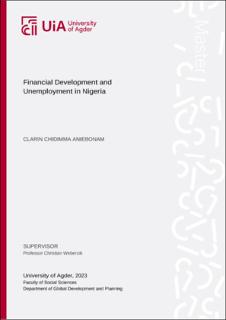Financial Development and Unemployment in Nigeria
Master thesis
Permanent lenke
https://hdl.handle.net/11250/3084909Utgivelsesdato
2023Metadata
Vis full innførselSamlinger
Sammendrag
Every government strives to offer its citizens decent work opportunities. However, this goal has proved unrealistic in many nations particularly developing economies like Nigeria with a persistent unemployment rate. Although several studies have documented the various determinants of unemployment, there is hardly any study in Nigeria that has engaged the multidimensional nature of financial development. Additionally, there are hardly any studies in Nigeria that disaggregated the components of unemployment into gender dimensions and spatial locations. Given this, the study appraised the influence of the development of Nigeria’s financial sector on the unemployment rate. The research used financial access, depth, stability, and efficiency to cover the multidimensional financial development while also using aggregate, male, and female, as well as urban and rural unemployment data. Engaging Nigerian data between 1981 and 2021 as well as the dynamic ordinary least square technique, the research showed that the indicators of financial development (financial depth, access, efficiency, and stability) reduced aggregate unemployment. The study equally revealed that financial development reduced male and female unemployment rates in Nigeria as well as Nigeria’s rural and urban unemployment rates. Consequently, the study advises decision-makers to keep implementing measures to encourage financial development to increase the number of employment while also ensuring that other fundamental issues with the labour market are properly resolved.
